
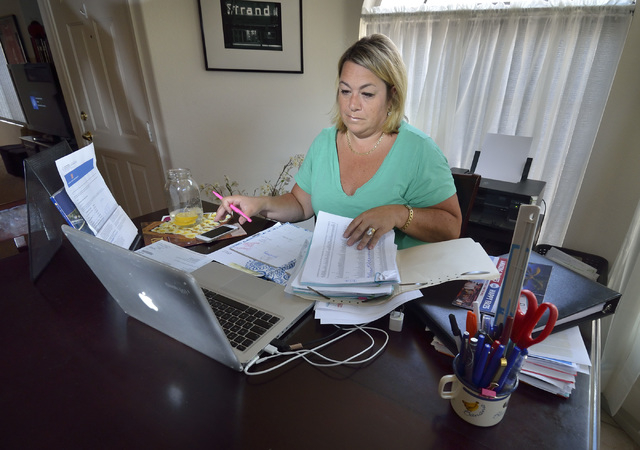
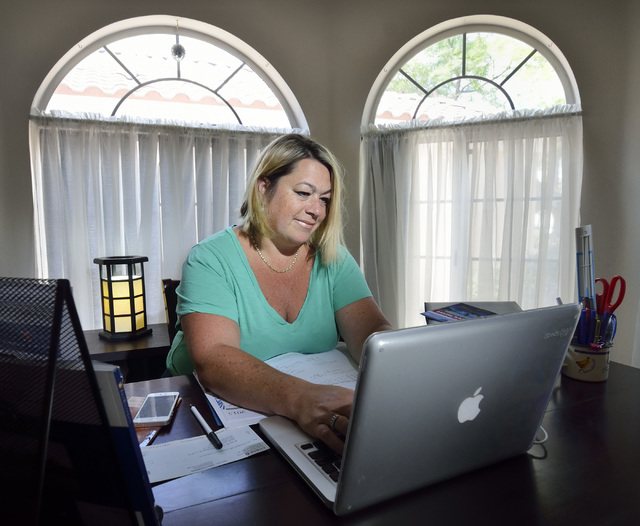
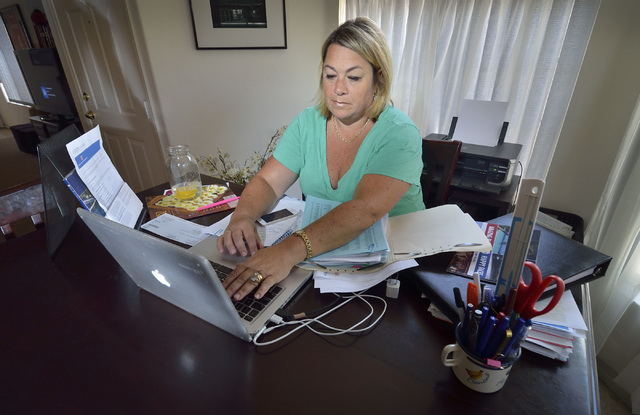
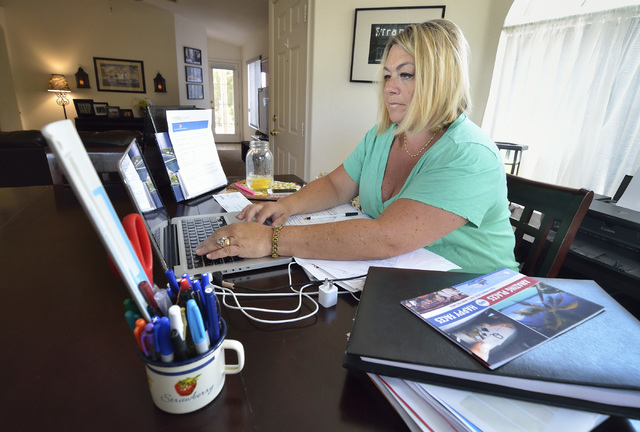
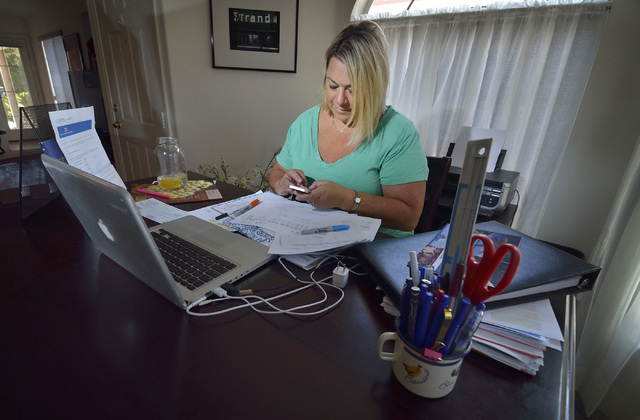
For the past decade, the dramatic increase in “work-from-home” or telecommuting jobs has been the leading trend within the domestic workforce. However with Las Vegas and Clark County being based so heavily in the hotel and gaming industry, it is a trend that has been slower to develop here, for once putting the area behind a large national trend and not leading it.
Nevada’s telecommuting population is 3.6 percent, below the national average of 4.3 percent and similar to states like Ohio and Wyoming. Las Vegas’ telecommuting population is even lower at 2.9 percent.
But the numbers aren’t the whole story.
Zappos is well down the road in using telecommuting and the casinos allow their high-end hosts to do their whale hunting from home. And there’s a wide world of opportunities offered by large national companies that don’t care where the work is done — as long as it is done well.
Although Las Vegas is a bit behind the telecommuting curve, many states in the region — like Arizona, Colorado and Idaho — lead the country in the number of residents who work from home.
According to FlexJobs, which operates the popular telecommuting website FlexJobs.com, between 2014 and 2015 the company has seen an increase of 26 percent in the number of telecommuting jobs listed. On a recent day, there were 3,800 telecommuting jobs on FlexJobs that Nevada residents qualify for, including both jobs across the U.S. where you can work from anywhere and ones that require you to be in Nevada.
“Companies that thrive with telecommuting rely more on results and less on face time when it comes to managing employees who work from home,” FlexJobs CEO Sara Sutton Fell says. “To be efficient and productive, telecommuting managers need to know what their teams’ short-term and long-term goals are, and to be proactive communicators with individual telecommuters, regularly checking in about their progress and roadblocks.
“Efficiency really is judged by the results a telecommuting employee is able to show, if they are hitting benchmarks, producing quality work, and communicating well with their managers and team. Those are all great signs of efficiency.”
Zappos experience
Efficiency is important regardless of the industry, and for online retailer Zappos, workplace flexibility occurs both onsite and at home.
“We use flexibility onsite at work for our employees, and use telecommuting as an option if they have a family illness, or just need time to focus,” says Kelly Wolskie, Zappos spokeswoman and member of the company’s Insights Team, which develops internal corporate culture programs and training.
“Our telecommuting process varies from team to team, depending on that department’s responsibilities,” Wolskie added. “For us it is all about making sure expectations are clear, and we like the camaraderie that occurs when people are plugged in at the office.”
Members of Wolskie’s Insight Team receive one day for every pay period to work from home. Other departments — like customer service — are unable to telecommute because of the logistics.
By providing flexibility at the workplace, remote and quiet areas to work around the campus, for individuals and groups, Zappos gives many of telecommuting’s benefits of while having the worker onsite.
Past attempts for the full-time telecommuting teams have stopped because of hardware compatibility issues, allowing Zappos to focus even more on occasional telecommuting and creating the more flexible onsite work environment their employees desire.
“People stay at jobs where they are happy at and that is the goal of our department,” Wolskie says. “The better the experience is for our workers, the better culture we create.”
For large companies, it is often easier to develop a standard telecommuting policy and implement it than for the workers who have to adjust from working at a brick-and-mortar office to working at home.
Casino hosts
Las Vegas’ casino industry has an exception to its brick-and-mortar offices for telecommuters in its independent casino host positions. The independent casino host is the “lone wolf” who works from home to attract players without having to report to an office every day. They report in to the casino as needed to serve clients, but their day-to-day tasks are conducted from home.
“It is such a more efficient process on a daily basis, especially if you are technology literate because of ease of communication,” says Stephanie Grgas, president of G&G Group, an independent casino hosting company that works with Caesars Entertainment Corp., MGM Resorts International and several other hotel-casinos locally, nationally and internationally. “Having a daily structure is important, so I start every morning by addressing the immediate needs of my East Coast clients in Atlantic City, then I move on to email and social communication outreach. Once that is done, I spend the rest of the day working on my West Coast and international clients.”
Grgas entered the casino business having telecommuted for his construction industry job in New York state. That experience has helped her seven years working as an independent casino host and a married mother of two teenage daughters.
“Family is always first, and my work is integrated within that on a daily basis,” Grgas says. “My work day may start at my desk at my home office, but then it will move to the doctor’s office for one of the girls’ appointments and then to a practice or sporting event. It is definitely an integrated schedule, but I also make sure that each family member gets their own time, too.”
For Tamiko Whitsett, the telecommuting life is brand-new. She used FlexJobs to land a telecommuting position in April as a social media consultant, working four hours per day, five days a week.
“I have already learned that I am connected to work longer because there are no set hours,” Whitsett, who juggles the part-time position with a full-time job. “I have the flexibility to wake up when I want and put in the hours when I want but the structure at home definitely has to be there. I set my hours to get the tasks done, and I stick to it, self-discipline is definitely the key.”
The three S’s
Whether a worker has been telecommuting for seven weeks, like Whitsett, or seven years like Grgas, they all stress the importance of the three S’s: schedule, structure and self-discipline.
Any items that could be a distraction — social media, television, radio and even cellphones should be turned off or silenced. Using these items regularly can extend an eight-hour workday to 10 or 12 hours.
“You have to be honest and always be evaluating yourself and your performance,” Whitsett says. “It is odd not having interaction with someone at a job, but it is all about your knowledge about what you are doing for the job.”
Along with the three S’s telecommuters also need excellent written and verbal communication skills.
“When you work alone you cannot be afraid to ask questions, clarify information and make sure you are on the right track,” FlexJobs’ Sutton Fell says. “From what we have seen over the last eight years, telecommuting can work well in virtually any industry.”
Several fields have been identified as being telecommute-friendly, led by information technology. Sales, customer service, education and training, accounting and finance and data entry are other popular telecommuting fields.
“For employers, a formal telecommuting policy is definitely something to put in place before a company decides to allow people to work home,” Sutton Fell says. “For employees, telecommuting can feel isolating so it is important for them to get their people fix every day, whether it is going to the gym or coffee shop.
“There is a depth and variety of telecommuting opportunities out there, it is just up to the workers to identify what works best for their lifestyle.”







